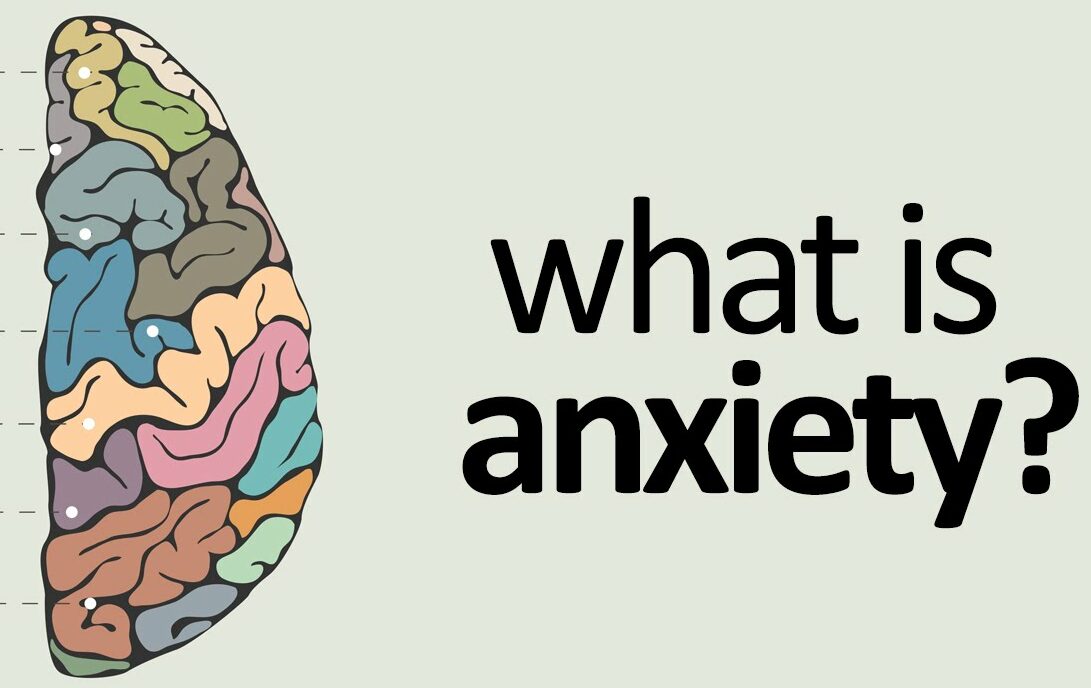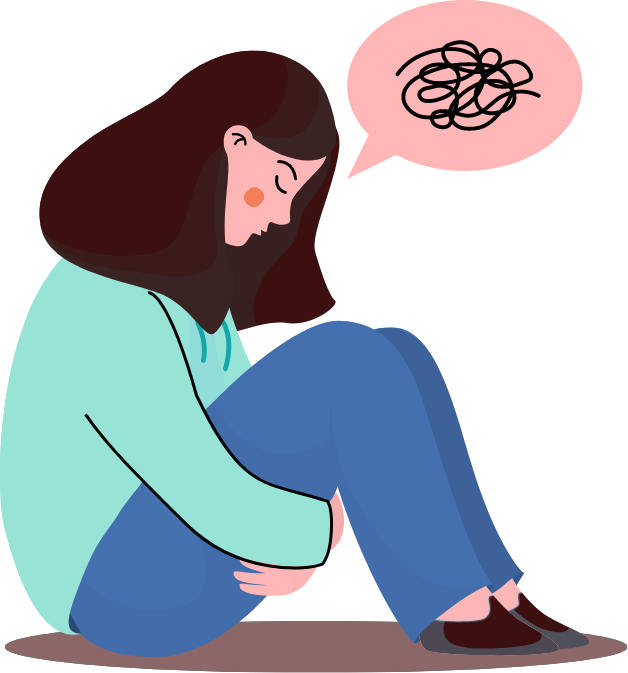Anxiety can be a crippling condition that affects people of all ages. It can cause physical and emotional symptoms that make it difficult to live a normal life. If you are concerned that you may have anxiety, it is important to get an accurate diagnosis. In this blog post, we will discuss how to know if you have anxiety and what to do about it!
Contents
What Is Anxiety?
 Anxiety is a normal emotion that everyone experiences at one time or another. It is a feeling of uneasiness, worry, or fear. Some people feel anxious all the time, even when there is nothing to be afraid of. This can be debilitating and make it hard to function in daily life. In simple words, anxiety can be described as “the worry” or “the jitters.”
Anxiety is a normal emotion that everyone experiences at one time or another. It is a feeling of uneasiness, worry, or fear. Some people feel anxious all the time, even when there is nothing to be afraid of. This can be debilitating and make it hard to function in daily life. In simple words, anxiety can be described as “the worry” or “the jitters.”
If you have anxiety, you may feel:
- restless
- tense
- irritable
- panicky
- a sense of impending danger, doom, or disaster
- shortness of breath
- heart palpitations (heart racing)
- sweating
- trembling or shaking
- weakness or fatigue
- difficulty concentrating
- trouble sleeping
These symptoms can be mild, moderate, or severe. They may come and go, or they may be constant. As it is believed that anxiety can be a daily occurrence for some people, it is important to be aware of the symptoms and to seek help if needed.
It is important to note that anxiety is not a mental disorder until it reaches a certain level of severity. It is a normal reaction to stress and can be beneficial in some situations.
Why Anxiety Diagnosis Is Important?
As we have discussed anxiety can be a daily routine for some people, and for others, it may be more situational. It can also come on very suddenly in the form of a panic attack. Anxiety can be debilitating, making it difficult to leave the house or even get out of bed in the morning. For many people, anxiety is a constant battle.
So how do you know if you have severe anxiety or if your symptoms are just normal everyday stress? Therefore, here are a few signs that indicate the importance of anxiety diagnosis because it may be more than just stress. These include:
- Feel like you can’t control your anxiety or worry
- Interferes with your work, school, or social life
- Avoids places or situations due to fear
- Experiences anxiety in most situations
- Have panic attacks
- Thoughts of death or suicide
- Excessive sweating, trembling, or heart palpitations
If you have any of these symptoms, it’s important to consult with a mental health professional for an anxiety diagnosis. They can help you develop a treatment plan further for recovery. Don’t suffer in silence, there is help available.
Who Can Do Anxiety Diagnosis?
 Diagnosis is a very technical and specific process that should only be done by a mental health professional. If you think you might have anxiety, the first step is to consult with your primary care physician.
Diagnosis is a very technical and specific process that should only be done by a mental health professional. If you think you might have anxiety, the first step is to consult with your primary care physician.
Furthermore, you must consult with a mental health professional who is trained in anxiety disorders and has experience diagnosing them. This could be:
- Psychiatrist
- Psychologist
- Clinical social worker
- Licensed counselor
These are a few professionals that are highly qualified to do anxiety diagnoses. Once you’ve consulted with one of these individuals, they will likely ask you a series of questions about your symptoms.
It’s important to be as honest as possible when answering these questions, as it will give the mental health professional the best chance of giving you an accurate diagnosis.
How Anxiety Is Diagnosed?
Now, let’s move on to how anxiety is diagnosed. Just like any other mental health disorder, anxiety is typically diagnosed by a mental health professional. There is a complete method of diagnosing anxiety, which usually includes:
- Clinical interviews
- Self-report measures
- Psychological testing
The clinical interview is the most important part of the diagnostic process as it allows the mental health professional to get to know the patient and their symptoms. This information is then used to rule out any other potential diagnoses and make a final determination.
Self-report measures are used to get an idea of how the patient is feeling on a day-to-day basis. This can be in the form of a questionnaire or survey that is completed by the patient.
Psychological testing may also be used in some cases to help rule out other potential mental health disorders and get a better understanding of the patient’s anxiety.
So, with these three methods, a mental health professional can diagnose anxiety. If you think you may be experiencing anxiety, reach out to a professional and start the process of getting help.
Is Anxiety Diagnosis Different Between Children And Adults?
 Yes, the anxiety diagnosis between children and adults is different many times. The reason might be that people think children can’t have anxiety or that their symptoms must be different than adults, but this isn’t the case. Anxiety disorders look very similar across the lifespan.
Yes, the anxiety diagnosis between children and adults is different many times. The reason might be that people think children can’t have anxiety or that their symptoms must be different than adults, but this isn’t the case. Anxiety disorders look very similar across the lifespan.
The main difference is that children may not be able to articulate their feelings as well as adults. And may instead show their anxiety through behavioral changes such as clinginess, irritability, or defiance. It’s important to know that these behaviors are a child’s way of communicating their anxiety and not misbehavior.
In fact, the diagnosis is different in that children may not meet the full criteria for an anxiety disorder. The reason is that children’s brains are still developing and they may not have all the symptoms required for a diagnosis. For example, a child who only has separation anxiety may not meet the criteria for social anxiety disorder. Because they haven’t had enough experience with people yet to be afraid of them.
If your child is displaying any of the above symptoms, it’s important to talk to a professional. They can help you figure out if your child has anxiety and what the best treatment options are. Similarly, with adults, if you think you might have anxiety, the first step is to talk to a professional.
What Can You Do To Manage Anxiety?
When you think you might have anxiety, or if you’ve been diagnosed with an anxiety disorder, there are a few things that can help you manage it.
Understand your triggers
First, it’s important to understand what might be triggering your anxiety. If you’re not sure, talking to a therapist can be really helpful. Once you know what’s triggering your anxiety, you can try to avoid those triggers or be prepared for them. More often than not, though, it’s not possible to completely avoid your triggers.
Challenge your thoughts
Anxiety is often related to negative thinking patterns, or what cognitive behavioral therapists (CBT) call “automatic thoughts.” These are the negative, self-defeating thoughts that run through your head on a loop, such as “I’m not good enough,” “I’m going to fail,” or “People are judging me.”
To combat these types of thoughts, CBT recommends a technique called “thought challenging.” This involves taking a step back and critically evaluating the evidence for and against your negative thoughts. Once you realize that your thoughts are not based on reality, you can start to replace them with more positive, realistic ones.
Relaxation techniques
There are a few different relaxation techniques that can help with anxiety. Some common ones include:
- Deep breathing: This involves taking slow, deep breaths and focusing on your breath going in and out. This can help to calm your body and mind.
- Progressive muscle relaxation: This involves tensing and relaxing different muscle groups in your body. This can help to release tension and ease anxiety symptoms.
- Mindfulness: It involves paying attention to the present moment and focusing on your breath. This can help you to be more aware of your thoughts and emotions and can help to reduce anxiety.
Talk to your loved ones
Talking to your loved ones about your anxiety can be really helpful. They may be able to provide support and understanding, which can be very valuable. Because when you share your thoughts with people who are close to you, it can help lessen the load that you feel. This is especially true if you’re avoiding activities you used to enjoy or if you’re having difficulty concentrating.
Take therapy
 Therapy is an excellent way to address anxiety. It can help you understand your thoughts and feelings, develop healthy coping mechanisms, and find ways to manage stress. If you’re considering therapy, make sure to choose a therapist who is experienced in treating anxiety disorders. Some common therapies that are widely effective for anxiety include:
Therapy is an excellent way to address anxiety. It can help you understand your thoughts and feelings, develop healthy coping mechanisms, and find ways to manage stress. If you’re considering therapy, make sure to choose a therapist who is experienced in treating anxiety disorders. Some common therapies that are widely effective for anxiety include:
- Cognitive-behavioral therapy (CBT)
- Interpersonal psychotherapy
- Exposure therapy
- Acceptance and Commitment Therapy (ACT)
Maintain healthy lifestyle
A healthy lifestyle is essential for managing anxiety. Eating a balanced diet, getting regular exercise, and getting enough sleep are all important components of maintaining a healthy lifestyle. Additionally, managing stress levels is also important for people with anxiety. These things can help to keep anxiety symptoms under control and prevent them from getting worse.
If you think you might have anxiety, it is important to see a doctor or mental health professional for an anxiety diagnosis. They will be able to rule out other potential causes of your symptoms and provide you with treatment options.
Conclusion
In conclusion, anxiety diagnosis is often a tricky process. There are many different types of anxiety, and each person experiences it in their own way. Also, this mental disorder can be difficult to diagnose because it often co-occurs with other mental health conditions.
However, if you are experiencing symptoms of anxiety that are impacting your day-to-day life, it is important to reach out to a mental health professional. They can help you figure out if you have anxiety and develop a treatment plan.
For more tips and guidance, you can reach out to Therapy Mantra. The team of professional counselors and therapists is more than happy to help you in your journey to recovery. Contact us today to learn more about our services. You can also book an online therapy session or download our free Android or iOS app.


